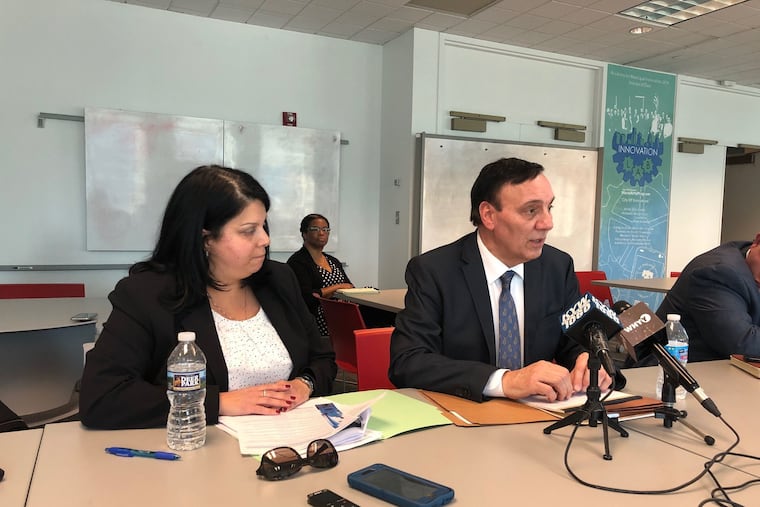The city fielded 40 sexual-harassment complaints since implementing its online form
The city controller recommended creating a centralized unit of personnel to investigate all sexual harassment complaints. Rebecca Rhynhart says that hasn't been implemented

Between July 2018 and January 2019, the City of Philadelphia received 40 complaints of sexual harassment or misconduct within city government, a number officials say is higher since the administration created a tool to file complaints online.
Of the complaints fielded, inquiries were completed in 16 cases and, of those, nine complaints were “substantiated” by city investigators, said William Twardzik, deputy director of the Mayor’s Office of Labor Relations. Of the nine substantiated complaints, there was a “range” of disciplinary action including verbal warnings and suspension, Twardzik said. No one has been fired.
The remaining 24 complaints are still under investigation. Twardzik added that most of the complaints received were allegations an employee created a “hostile work environment," and about half were about incidents that took place prior to July. (For context, there were 121 sexual-misconduct case files spanning six years between July 2012 and April 2018.)
The figures were disclosed Tuesday during a briefing with administration officials who provided a six-month update on the implementation of revised policies and procedures related to sexual-harassment reporting and investigations within city government.
Monica Marchetti-Brock, director of the Mayor’s Office of Labor Relations, said new sexual-harassment training procedures are well underway. The Ballard Spahr law firm was retained to provide investigation training to HR professionals. Rank-and-file employees will undergo training via an online regimen that remains under development.
Philadelphia voters last year approved a ballot measure requiring that all city employees receive sexual-harassment training at least every three years. Training is to be delivered to all employees by this fall.
“Some of the feedback we’ve received regarding the training is that people didn’t know what they didn’t know,” Marchetti-Brock said. “And really breaking down the examples into language that they can understand was really helpful for them.”
She said the city will soon add three staff members to her Employee Relations Unit (ERU), which now has 11 staffers and serves as a sort of clearinghouse for sexual-harassment complaints lodged by any of the city’s more than 20,000 employees. Under the city’s new policy, the unit tracks complaints through a case-management tracking system. Once a complaint is entered into the system, the ERU will investigate the complaint itself or refer it to the department’s human resources officer.
Employees can make a complaint several ways, including through the new online portal. They can also report to the designated HR professional in their department or directly to the ERU.
In July, Mayor Jim Kenney signed an executive order instituting the new policy as City Controller Rebecca Rhynhart released an audit critical of the city’s procedures, calling its sexual-harassment policy "opaque and complicated.” Her office reported the city had spent at least $2.2 million over six years to settle sexual-misconduct claims.
Rhynhart’s office recommended the city create a centralized unit that would investigate all sexual-harassment complaints across city government and codify a citywide disciplinary schedule to ensure penalties are uniform. Neither of those recommendations has been implemented as Rhynhart’s office outlined.
Marchetti-Brock said the city sees the ERU as a centralized unit because it oversees all investigations. Rhynhart said the lack of a unit to actually investigate all complaints allows for bias because investigators are embedded in city departments. She said the idea that dozens of city departments will handle sexual-misconduct investigations in a consistent manner is “hard to fathom.”
The city also does not plan to implement a disciplinary schedule because “every case is different and needs to be looked at individually," Marchetti-Brock said, though she noted the ERU makes disciplinary recommendations to departments.
Rhynhart said auditors from her office found discipline for sexual harassment and misconduct varied between departments prior to the implementation of the new sexual-harassment policy. For example, several departments issued suspensions for inappropriate conversations, while another issued a written warning to an employee accused of groping a coworker. In addition, they found five departments where lower-level employees were punished more severely than supervisors for similar conduct, she said.
“Having one phone line into a centralized unit, that’s the way to protect the workers of the city," Rhynhart said. “And unfortunately it’s not happening.”
Kenney’s administration has said the policy and procedures will be reviewed annually.